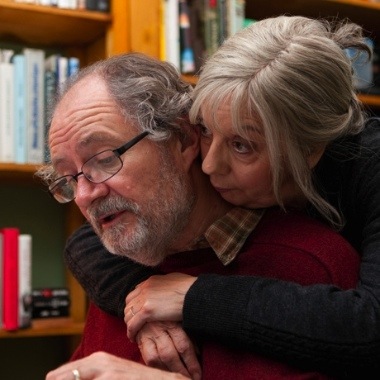"Mike Leigh's Mary: a bogeywoman for middle-aged females": The Guardian
Here's a very interesting article about my aforementioned film of the year (thus far): Mike Leigh's "Another Year", which, BTW, I'll be going to see for the third time tomorrow (visits 2 + 3 = taking friends along to see it who otherwise wouldn't have bothered). It makes me want to get a copy of "Happy-Go-Lucky" which I never got round to seeing when it came out (update: I have now ordered it on Amazon).
*************************************
In Another Year, Mike Leigh creates a ghastly femme d'un certain age in Lesley Manville's character, Mary. But does it have the ring of truth, or is it misogynist?
Are there any women over 35 who will have watched Another Year without a shudder? Mary, Lesley Manville's character – who bowls her way self-pityingly into the lives of the central couple, Tom and Gerri (Jim Broadbent and Ruth Sheen) – is a brilliant and horrific creation. She is a bogeywoman with whom we women d'un certain age can scare ourselves stupid; a spectre of wine-soaked, self-regarding, middle-aged femininity that is all the more horrendous for its recognisability. Who among us hasn't known a Mary weeping into the lees of her wine, bemoaning singledom/heartbreak/bad luck? Who among us hasn't – at one point or another – been dangerously close to being Mary? My most fervent atheistic prayer on watching Another Year was "Don't let me ever, ever become like her (again)."
 Lesley Manville as Mary (centre), with Ruth Sheen and Oliver Maltman in Another Year.
Lesley Manville as Mary (centre), with Ruth Sheen and Oliver Maltman in Another Year.
Does Leigh's representation of Mary border on the misogynist, as David Cox suggested in a blog on the film site this week? For my money, no. It's mostly because, actually, Mary rings so true. It's partly because Leigh distributes the nuttiness fairly even-handedly between the genders. (I don't want to give away the plot, in so far as it has one, but there are three men who are, shall we say, deeply troubled in the film, and two perfectly sane and delightful women, not that it's a numbers game). I think, too, that the crucial point is that Another Year should be seen in apposition to Leigh's previous film, Happy-Go-Lucky. As Peter Bradshaw pointed out in his Guardian review of the film, Mary is the other side of the coin of Happy-Go-Lucky's central character, Poppy. Poppy is single, contented, self-possessed and enjoys happy relationships with friends. In that film, it is those in family units – notably Poppy's sister who is expecting her first child in supposed suburban bliss – who are angst-ridden and discontented. In my view, that film earned Leigh the right to create a Mary. The two films are companion pieces in many ways. The intertextuality alert (as Bradshaw points out) is surely Mary and Poppy's contrasting involvements with automobiles. (For an insight into Leigh's creative process, turn to Xan Brooks's recent interview with the film-maker.)
Among women of my acquaintance, I was interested that one, a psychotherapist found that Another Year "mirrors middle-class life as I know it and see it. It shows explicitly why some people are miserable and others not." She added: "Mary prefers to live in denial of what she is rather than change herself," citing Mary's oft-repeated, and clearly absurd assertion, "I don't really smoke." In this state of denial, argued the therapist, "The problem will always be perceived to be external ('I have bad luck')." At one point, Gerri counsels Mary to "see somebody" and get some help. In my own imagined version of the continued story, that's just what Mary does. In good news, I've known few people who've been Marys for ever – thank god.
http://www.guardian.co.uk/culture/charlottehigginsblog/2010/nov/09/mike-leigh-another-year-women
guardian.co.uk © Guardian News & Media Limited 2010 | Use of this content is subject to our Terms & Conditions | More Feeds

Comments